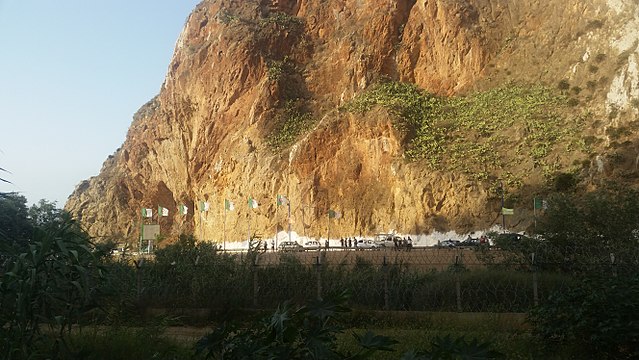Updated
Once Again, the King of Morocco Calls for a “Frank Dialogue” with Algeria – Ambassador Edward M. Gabriel (ret.)

Closed Algerian Moroccan border Photo: Akaki98/Wikimedia Commons
Ambassador Edward M. Gabriel (ret.)
November 23, 2018
 I can personally testify to King Hassan II’s optimism that the Algerian-Moroccan relationship would significantly improve following President Abdelaziz Bouteflika’s election in April of 1999. King Hassan would die three months later and, although Bouteflika would attend his funeral and call the new King a “brother,” within two months he would prove to have little interest in improving relations with his neighbor. In September of 1999, he would send a condescending letter offering his views on how to “manage” Morocco to the newly enthroned King Mohammed VI that would cool the latter’s optimism and lead him to question Bouteflika’s seriousness about overcoming their bilateral differences.
I can personally testify to King Hassan II’s optimism that the Algerian-Moroccan relationship would significantly improve following President Abdelaziz Bouteflika’s election in April of 1999. King Hassan would die three months later and, although Bouteflika would attend his funeral and call the new King a “brother,” within two months he would prove to have little interest in improving relations with his neighbor. In September of 1999, he would send a condescending letter offering his views on how to “manage” Morocco to the newly enthroned King Mohammed VI that would cool the latter’s optimism and lead him to question Bouteflika’s seriousness about overcoming their bilateral differences.
When I read the King’s speech on the anniversary of the Green March this November 6, calling for a direct and frank dialogue with Algeria “in order to settle the transient and objective differences impeding the development of relations between the two countries,” I was surprised, not because the King called for a frank dialogue, but rather because it was yet another offer by him, one of probably more than a dozen, calling for détente and opening the borders.
Indeed, the first effort was immediately following King Hassan’s funeral when King Mohammed called for a bilateral summit between the two countries, with the goal to reopen their common border, which had been closed in 1994. Bouteflika’s disrespectful letter of September ’99 would nix that one.
A constant talking point by American officials has been the request that the King reach out and talk to the Algerians to improve the bilateral relations between the two countries, to which he would always respond positively, based upon the close and respectful relationship with the United States.
Deputy Assistant Secretary of State, Ron Neumann, would visit Morocco in 1999 and, among other issues, suggest it enter dialogue with the Algerians with a goal of reopening the border. Assistant Secretary of State Martin Indyk would recommend that the Moroccans start a dialogue with the Algerians to cooperate on border security as a means of cooling tensions and, thus, creating a better atmosphere for negotiating on the Sahara issue.
Others would follow with American demarches, which would always include a call for détente with the Algerians: Secretary Albright’s visit in 1999, Secretary Cohen’s visits in 1998 and 2000, President Clinton in 2000, and Secretary Clinton in 2009, among others.
In 2003, in a meeting with King Mohammed discussing the Western Sahara, President Bush asked the King to approach the Algerians to try to improve relations and reduce tensions. King Mohammed went as far as to establish stronger security measures along the Algerian border to address alleged illegal contraband and border crossings, without the cooperation of the Algerians. In the summer of 2004, the Moroccan government would even lift the visa requirement for Algerian travelers to visit Morocco, only to be rebuffed by the Algerian government.
Over the past 20 years, the King has sent emissaries and private and public messages encouraging a dialogue, but to no avail. This time may be different given the recent positive disposition of the UN towards Morocco’s negotiating position on the Sahara issue. Whether or not Algeria will respond constructively will clearly indicate if it is serious about ending the conflict, or if it intends to continue backing the Polisario, thus perpetuating instability along its border areas.
The King’s deft approach remains conciliatory. In his recent speech, he recalled a time when “[Morocco’s] position in support of the Algerian revolution strengthened the bonds between the Moroccan Monarchy and the Algerian Resistance. It also paved the way for joint Maghrebian political awareness and action… Together, we fought colonial rule for many years until independence was obtained…and many Moroccan and Algerian families are united by the bonds of marriage and kinship…. our peoples’ interests are best served by our unity, integration and complementarity.”
In many ways, the Maghreb region is falling behind in terms of economic and social progress. It is beset by forces both domestic and foreign that can lead to greater instability and insecurity if the two strongest powers in the region cannot find a way to resolve their differences. With its stability and success in building relations with countries to its north, south, and west, Morocco has a definite vision for its future. In setting its priorities, a sense of realism is critical. Is it worth its time to wait for Algeria to abandon its reluctance to cooperate or should it spend its efforts elsewhere? The conciliatory words of King Mohammed once again create an opening for the Algerians to put the past behind them and snatch this opportunity for dialogue and reconciliation.